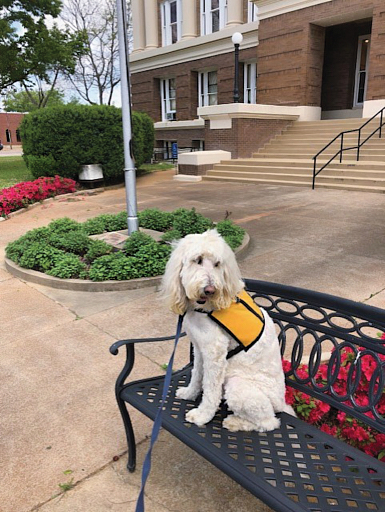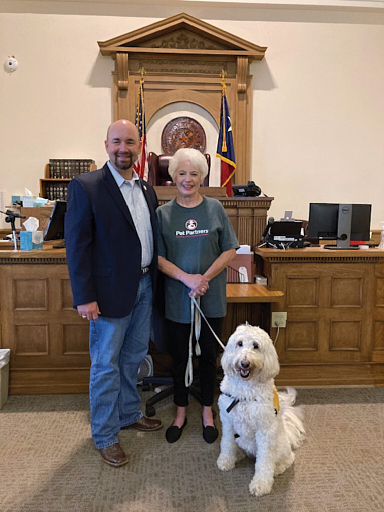A Longhorn Makes It Possible for Victims to Have Therapy Dogs in Texas Courtrooms

Sharon Davis, BS ’64, wants to make one thing extremely clear: She won’t take the credit. Instead, she insists that the Texas Legislature’s recent bill granting therapy dogs a presence in courtrooms was passed because of her late dog, Sophie. Davis says all she really did was hold the leash.
Davis, who worked in special education in Palestine, Texas, for 45 years before she served as Sophie’s handler and adoring owner, alludes to an almost mystical ability the large, white dog had for comforting others. “It’s almost like she was born to do it,” Davis says. “You don’t teach temperament. Either they have it, or they don’t have it. And Sophie really had it.”
Davis was first inspired to seek out volunteer work as a therapy dog handler after witnessing the joy another therapy dog brought young students in her school’s special education program, which she led as director for the last 20 years of her career.
“It just almost makes me cry remembering it. [The dog] came every day to school. He had little kids crawling all over him all the time, and he never batted an eye,” Davis says. “So I thought, You know what, when I retire, I think that’s what I want to do. And I’ve always been a pet lover.” Davis found Sophie in 2009 and immediately began socializing her by exposing her to different environments and working on obedience training. She had her evaluated and certified through nonprofit Pet Partners in 2011 when Sophie turned 2 years old. “From that point on, there we went,” Davis says.

The pair began volunteering at residential treatment centers, schools, nursing homes, crisis centers, and hospitals. “Every place that needed a therapy dog, we worked it,” she says. Although Davis regrets not having cataloged those who benefited from Sophie’s innate ability to console, she estimates that as a pair they worked with hundreds of individuals over the years. Palestine, shrouded in East Texas’ Piney Woods, is not a large city; it clocked in at fewer than 20,000 residents during the most recent census. Davis’ passion for volunteering and Sophie’s sweet demeanor did not go unnoticed in their tight-knit community. The pair were approached by a victim coordinator—someone who provides support to victims and their families during court proceedings—about bringing their therapy duo to the county courthouse. Soon, Davis and Sophie were foregoing other volunteer opportunities to be readily available to help comfort those testifying in difficult cases.
“Sophie became a courthouse fixture. Everybody knew her,” Davis says. “She was just perfect. We would go into a room where the victim was, and there would be other people there, and the victim wouldn’t be visibly upset, but Sophie would just go straight to them. She knew.”
After they began volunteering more frequently at the courthouse, Palestine District Attorney Allyson Mitchell approached Davis about a grant-funded, part-time position as an assistant victim coordinator. Davis laughs when she recalls the conversation. “I said to her, ‘What are you doing asking me about a job?’” Although initially shocked by the opportunity, Davis went on to serve in the role for seven years, all while still volunteering alongside Sophie. While Sophie and Davis were a crucial comfort to victims before entering and after exiting the courtroom for years, the need for therapy dogs to be allowed inside an actual courtroom during proceedings became clear to Davis during a particularly difficult trial.
“One day we were there with a victim whom we’d seen several times, and she was going to have to testify. Normally we’d be there before and after testimony, but this time the district attorney stuck her head out the door about 10 minutes before and said the judge wanted Sophie to come with the victim into the courtroom,” Davis says. “Well, I panicked. We hadn’t practiced that. Sophie had been in the courtroom many times, but we had never done anything like that.”
Despite the lack of courtroom-specific training, Sophie did as she’d done for years: sat quietly next to someone experiencing pain and offered the comfort of her assured presence. “It was a sexual abuse case, so you can imagine what the testimony was like,” Davis says. “But that child never took her hands off Sophie. I thought, You know, if I never do anything else, this was something.”
Not long after Sophie’s courtroom debut, Davis saw that Florida had signed into law a bill that would allow therapy animals in courtrooms. She didn’t wait. She picked up the phone and called her state representative, Cody Harris (R-Palestine).
“I was thinking, Well, if they do it in Florida, we ought to be able to do it here in Texas,” Davis says. A couple weeks later, Harris’ staff confirmed that he was interested in sponsoring her proposed bill. Davis’ bill, which focuses particularly on allowing therapy dogs courtroom access during witness testimony, received bipartisan support in the Lege and was signed into law by Gov. Greg Abbott, BBA ’81, Life Member, Distinguished Alumnus, during Texas’ 87th legislative session in 2021.
Rep. Harris says the bill’s passage reflects the impact a singular individual can have on Texas legislation. “I am grateful for her idea and that she worked with my staff to get this bill filed and passed. Now, both civil and criminal cases have the option of utilizing a dog to help comfort witnesses going through the court process,” Rep. Harris says. “Having a trained dog there to provide comfort and some sense of safety can make all the difference for those kids.”

The gratification of having the bill passed is somewhat eclipsed by grief for Davis. The bill was signed into law the same year Davis said goodbye to Sophie after the dog’s short battle with leukemia. “We still have people to this day coming in wanting to know where Sophie is. And it just kills me,” Davis says. “It was truly great while it lasted.”
Although Davis sniffles while she shares how missed Sophie is, she brings her focus back to the bill’s impact in the two years since it’s been signed into law. Davis says she hasn’t heard many cases of people utilizing the bill in courtrooms and is concerned that not enough people know of its existence or feel intimidated by its certification requirements. She hopes that in time the bill will receive more exposure and therapy dogs will become more commonplace in courtroom settings. On her end, she is doing what she can to spread the word—alongside a new companion.
“I did not plan on getting another dog, but the courthouse was on my case,” Davis says, laughing. Poppy, a miniature goldendoodle, is about a year and a half old—and, boy, does she have some rather large paws to fill. “This little dog is wired,” Davis says. “She’s getting a little better, and she’s worked some with older children. She loves everybody ... and that’s part of the problem.”
Even if Poppy never makes it to being courtroom ready, Davis says she won’t be too disappointed. Like she’s said, whether it’s Poppy or Sophie on the other end, all Davis ever really did was hold the leash—a role she always found rewarding in itself.
Illustration by Christopher Silas Neal, photos courtesy of Sharon Davis





